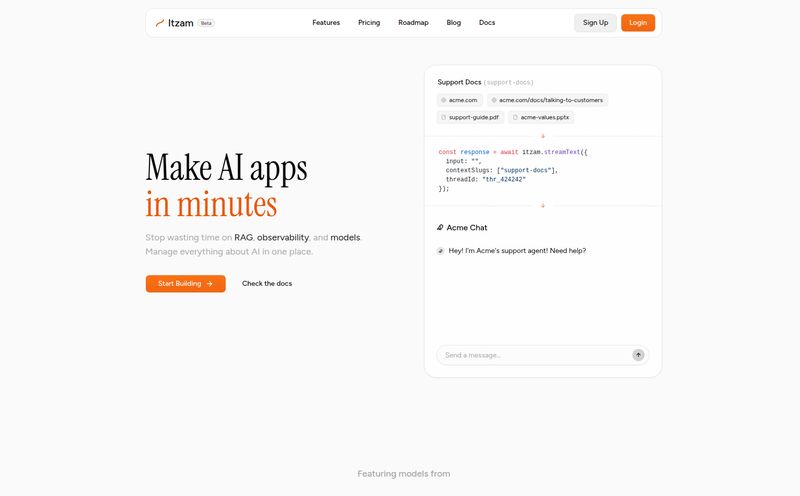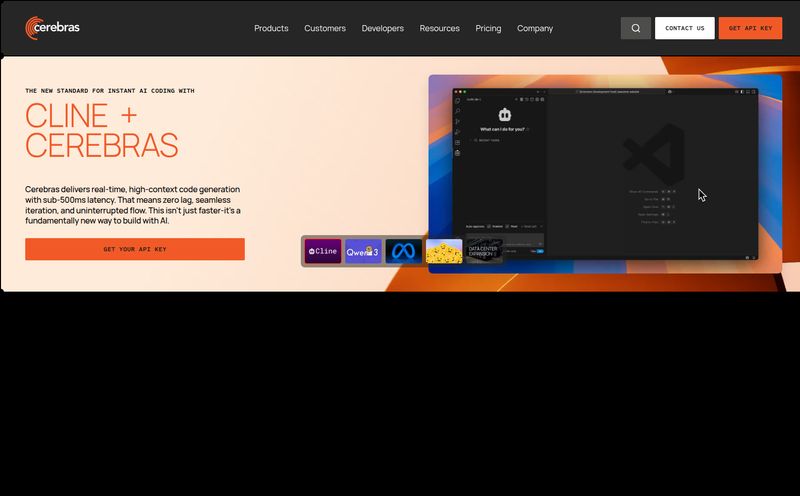Let’s have a little chat. You, me, and the ever-present, soul-crushing pull request (PR) queue. We’ve all been there. You push what you think is a masterpiece, a beautiful symphony of logic, only to have it sit there. Waiting. For days. It becomes the bottleneck, the traffic jam on the superhighway of development. Your senior dev is swamped, your other teammates are fighting their own fires, and progress grinds to a halt.
For years, we've just accepted this as... the way things are. The cost of doing business and ensuring code quality. But what if it didn't have to be? I've been keeping a close eye on the explosion of AI developer tools, and while many are just fancy autocomplete, one recently caught my eye: CR-Mentor. It claims to be an AI-powered code review assistant designed specifically to smash that bottleneck. I was skeptical, of course. I've seen a lot of hype. But after looking into it, I’m genuinely intrigued.

Visit CR-Mentor
So, What is CR-Mentor, Anyway?
Think of CR-Mentor not as a replacement for your senior dev, but as their tireless, infinitely patient junior partner. It's an AI assistant that hooks right into your GitHub workflow to help automate and standardize code reviews. The interesting part isn't just that it uses a Large Language Model (LLM)—every tool and their dog is doing that these days. It’s that it combines the creative, pattern-matching power of an LLM with a more structured, rules-based knowledge base.
This hybrid approach means it can give you both intelligent, context-aware suggestions (the LLM part) and ensure your team's specific coding standards and best practices are consistently followed (the knowledge base part). It’s like having a reviewer who has memorized every style guide ever written and has a good gut feeling for spotting potential issues.
The Soul of the Machine: CR-Mentor's Core Features
Alright, let's pop the hood and see what this thing is really made of. The features are where a tool either soars or falls flat, and CR-Mentor has some pretty compelling stuff going on.
More Than Just an LLM - The Knowledge Base Advantage
This is the bit I find most promising. You can feed CR-Mentor your team’s specific coding conventions, architectural patterns, and internal best practices. It builds a knowledge base from this. So, instead of getting generic advice, the AI's feedback is tailored to your projects. This is huge for keeping a codebase consistent, especially with a mix of senior, junior, and mid-level developers. It helps level the playing field and makes sure everyone is rowing in the same direction.
The AI Co-Pilot You Actually Want
The LLM side of the coin handles the heavy lifting of analysis. It scans single files or even entire multi-file pull requests to understand the bigger picture. I was particularly impressed with its ability to identify what it calls "risk code." This isn't just about syntax errors; it's about flagging overly complex functions, potential security vulnerabilities, or logic that might lead to nasty bugs down the line. It then offers optimization suggestions. It’s one thing to point out a problem; it’s another thing entirely to suggest a fix.
Visualizing the Flow with Automatic Diagrams
Okay, this is just cool. For complex pull requests that touch multiple parts of the application, CR-Mentor can automatically generate code walkthroughs and even sequence diagrams. If you've ever tried to manually trace the path of a request through five different services to understand a PR, you know how valuable this is. It's a massive time-saver and a fantastic tool for getting a high-level overview of what a change actually does, not just what the code says.
It Speaks Your Language (and Your Team's)
As you'd expect from a modern tool, it supports all the major programming languages—Python, JavaScript, Java, Go, you name it. The integration with GitHub is the main draw here. It lives where your code lives, commenting on PRs just like a human team member would. This lack of friction is critical; no one wants to add yet another external dashboard to their daily workflow. The fact that it fits right in is a major plus.
Why I'm Genuinely Excited About This
I’ve seen tools come and go, but CR-Mentor seems to address a core, nagging pain in the development process. The biggest win is raw efficiency. Automating the first pass of a review frees up your senior developers to focus on the big, architectural questions instead of getting bogged down in style guides and simple logic checks. It’s a force multiplier for your most valuable people.
Beyond that, think about onboarding. Throwing a new developer into a complex codebase is daunting. A tool like this acts as an immediate mentor, providing instant feedback and helping them learn your team's specific standards from day one. It accelerates that journey from 'newbie' to productive team member. This knowledge transfer aspect is, in my opinion, an unsung hero of tools like this.
Let's Be Real - The Potential Hiccups
No tool is perfect, and it would be dishonest to pretend otherwise. My main hesitation with any LLM-based tool is its dependency on the model's current state. These models are always evolving, which is great, but it also means you might need to stay on your toes to get the most out of it. It’s a learning process for both you and the AI.
Also, that amazing customization via the knowledge base? It won't happen by magic. There's an initial setup and configuration cost. You’ll need to invest some time upfront to teach CR-Mentor your ways. For teams with well-documented standards, this might be easy. For teams where the 'rules' live in the senior dev's head... well, it might be a bit more work. Finally, its power is currently tied pretty closely to GitHub. If your team is on GitLab or Bitbucket, you might be out of luck for now.
The Big Question... What's the Price?
Okay, this is where things get... interesting. I went to their pricing page expecting the usual tiered SaaS model, and I found it, but with a twist. Take a look:
| Plan | Best For | Price |
|---|---|---|
| Free | Simple personal projects | $0 /mo |
| Pro | Small teams and professionals | $0 /mo |
| Premium | Large agencies and businesses | $0 /mo |
You’re reading that right. As of this writing, all tiers are listed at $0/month with "unlimited access to all features." I had to double-check this. My guess? This is likely an introductory offer to get users on the platform. I wouldn't bet on it staying free forever, especially for the Pro and Premium tiers. But for now, it presents a zero-risk opportunity to try out a potentially game-changing tool. My advice: if you're even a little curious, jump on it while this offer stands.
Frequently Asked Questions about CR-Mentor
- 1. Will CR-Mentor completely replace our human code reviewers?
- Absolutely not. The goal isn't replacement, it's augmentation. Think of it as handling the first 80% of the review—checking for standards, common pitfalls, and complexity. This frees up your human reviewers to focus on the things that matter most: architectural integrity, business logic, and the overall approach to a problem.
- 2. Is CR-Mentor difficult to set up?
- The basic GitHub integration is straightforward. The real work comes in customizing the knowledge base to match your team's specific standards. The initial effort you put in here will directly correlate with the quality of the reviews you get back. So, it can be as simple or as involved as you want it to be.
- 3. What programming languages does CR-Mentor support?
- It's designed to be language-agnostic and supports all major modern languages like Python, JavaScript, TypeScript, Java, Go, Ruby, C#, and more. Its analysis focuses on structure, logic, and risk rather than being tied to one specific language's quirks.
- 4. Is it really free? What's the catch?
- As of now, yes, all tiers are listed as free. The most likely 'catch' is that this is a limited-time launch promotion to build a user base. Companies often do this to gather feedback and case studies. It’s a good idea to check their official pricing page for the most current information.
- 5. How does it handle complex, multi-file changes?
- This is one of its strengths. Unlike simpler linters that only look at one file at a time, CR-Mentor analyzes the entire pull request. This allows it to understand how different pieces of the code interact, and its ability to generate sequence diagrams is a direct result of this comprehensive analysis.
My Final Thoughts on CR-Mentor
Look, the dreaded PR bottleneck isn't just an annoyance; it's a drag on morale and a real cost to business. It slows down feature releases, frustrates developers, and creates a dependency on a few key people. A tool like CR-Mentor represents a real shot at changing that dynamic.
The combination of a customizable knowledge base with a powerful LLM is the right approach, in my book. It's smart, yet trainable. While it's not a silver bullet—you still need skilled engineers—it has the potential to be an incredibly powerful assistant. It can make your team faster, your code better, and your new hires more effective. And at its current price point of... well, free... it’s an absolute no-brainer to take it for a spin. You’ve got nothing to lose but your PR queue.
Reference and Sources
CR-Mentor Official Website & Pricing: https://cr-mentor.com/en#pricing
GitHub Platform: https://github.com/



